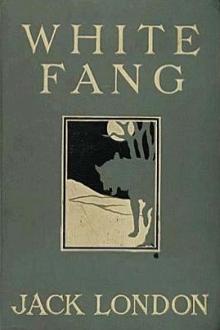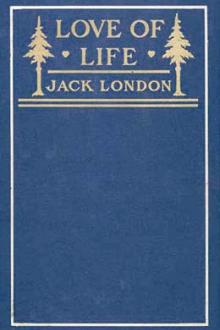White Fang by Jack London (first ebook reader txt) 📗

- Author: Jack London
Book online «White Fang by Jack London (first ebook reader txt) 📗». Author Jack London
As an enemy of his kind, it was in White Fang’s province to fight with them. This he did, and he quickly achieved for them a mighty contempt. They were soft and helpless, made much noise, and floundered around clumsily trying to accomplish by main strength what he accomplished by dexterity and cunning. They rushed bellowing at him. He sprang to the side. They did not know what had become of him; and in that moment he struck them on the shoulder, rolling them off their feet and delivering his stroke at the throat.
Sometimes this stroke was successful, and a stricken dog rolled in the dirt, to be pounced upon and torn to pieces by the pack of Indian dogs that waited. White Fang was wise. He had long since learned that the gods were made angry when their dogs were killed. The white men were no exception to this. So he was content, when he had overthrown and slashed wide the throat of one of their dogs, to drop back and let the pack go in and do the cruel finishing work. It was then that the white men rushed in, visiting their wrath heavily on the pack, while White Fang went free. He would stand off at a little distance and look on, while stones, clubs, axes, and all sorts of weapons fell upon his fellows. White Fang was very wise.
But his fellows grew wise in their own way; and in this White Fang grew wise with them. They learned that it was when a steamer first tied to the bank that they had their fun. After the first two or three strange dogs had been downed and destroyed, the white men hustled their own animals back on board and wrecked savage vengeance on the offenders. One white man, having seen his dog, a setter, torn to pieces before his eyes, drew a revolver. He fired rapidly, six times, and six of the pack lay dead or dying—another manifestation of power that sank deep into White Fang’s consciousness.
White Fang enjoyed it all. He did not love his kind, and he was shrewd enough to escape hurt himself. At first, the killing of the white men’s dogs had been a diversion. After a time it became his occupation. There was no work for him to do. Grey Beaver was busy trading and getting wealthy. So White Fang hung around the landing with the disreputable gang of Indian dogs, waiting for steamers. With the arrival of a steamer the fun began. After a few minutes, by the time the white men had got over their surprise, the gang scattered. The fun was over until the next steamer should arrive.
But it can scarcely be said that White Fang was a member of the gang. He did not mingle with it, but remained aloof, always himself, and was even feared by it. It is true, he worked with it. He picked the quarrel with the strange dog while the gang waited. And when he had overthrown the strange dog the gang went in to finish it. But it is equally true that he then withdrew, leaving the gang to receive the punishment of the outraged gods.
It did not require much exertion to pick these quarrels. All he had to do, when the strange dogs came ashore, was to show himself. When they saw him they rushed for him. It was their instinct. He was the Wild—the unknown, the terrible, the ever-menacing, the thing that prowled in the darkness around the fires of the primeval world when they, cowering close to the fires, were reshaping their instincts, learning to fear the Wild out of which they had come, and which they had deserted and betrayed. Generation by generation, down all the generations, had this fear of the Wild been stamped into their natures. For centuries the Wild had stood for terror and destruction. And during all this time free licence had been theirs, from their masters, to kill the things of the Wild. In doing this they had protected both themselves and the gods whose companionship they shared.
And so, fresh from the soft southern world, these dogs, trotting down the gang-plank and out upon the Yukon shore had but to see White Fang to experience the irresistible impulse to rush upon him and destroy him. They might be town-reared dogs, but the instinctive fear of the Wild was theirs just the same. Not alone with their own eyes did they see the wolfish creature in the clear light of day, standing before them. They saw him with the eyes of their ancestors, and by their inherited memory they knew White Fang for the wolf, and they remembered the ancient feud.
All of which served to make White Fang’s days enjoyable. If the sight of him drove these strange dogs upon him, so much the better for him, so much the worse for them. They looked upon him as legitimate prey, and as legitimate prey he looked upon them.
Not for nothing had he first seen the light of day in a lonely lair and fought his first fights with the ptarmigan, the weasel, and the lynx. And not for nothing had his puppyhood been made bitter by the persecution of Lip-lip and the whole puppy pack. It might have been otherwise, and he would then have been otherwise. Had Lip-lip not existed, he would have passed his puppyhood with the other puppies and grown up more doglike and with more liking for dogs. Had Grey Beaver possessed the plummet of affection and love, he might have sounded the deeps of White Fang’s nature and brought up to the surface all manner of kindly qualities. But these things had not been so. The clay of White Fang had been moulded until he became what he was, morose and lonely, unloving and ferocious, the enemy of all his kind.
THE MAD GOD
A small number of white men lived in Fort Yukon. These men had been long in the country. They called themselves Sour-doughs, and took great pride in so classifying themselves. For other men, new in the land, they felt nothing but disdain. The men who came ashore from the steamers were newcomers. They were known as chechaquos, and they always wilted at the application of the name. They made their bread with baking-powder. This was the invidious distinction between them and the Sour-doughs, who, forsooth, made their bread from sour-dough because they had no baking-powder.
All of which is neither here nor there. The men in the fort disdained the newcomers and enjoyed seeing them come to grief. Especially did they enjoy the havoc worked amongst the newcomers’ dogs by White Fang and his disreputable gang. When a steamer arrived, the men of the fort made it a point always to come down to the bank and see the fun. They looked forward to it with as much anticipation as did the Indian dogs, while they were not slow to appreciate the savage and crafty part played by White Fang.
But there was one man amongst them who particularly enjoyed the sport. He would come running at the first sound of a steamboat’s whistle; and when the last fight was over and White Fang and the pack had scattered, he would return slowly to the fort, his face heavy with regret. Sometimes, when a soft southland dog went down, shrieking its death-cry under the fangs of the pack, this man would be unable to contain himself, and would leap into the air and cry out with delight. And always he had a sharp and covetous eye for White Fang.
This man was called “Beauty” by the other men of the fort. No one knew his first name, and in general he was known in the country as Beauty Smith. But he was anything save a beauty. To antithesis was due his naming. He was pre-eminently unbeautiful. Nature had been niggardly with him. He was a small man to begin with; and upon his meagre frame was deposited an even more strikingly meagre head. Its apex might be likened to a point. In fact, in his boyhood, before he had been named Beauty by his fellows, he had been called “Pinhead.”
Backward, from the apex, his head slanted down to his neck and forward it slanted uncompromisingly to meet a low and remarkably wide forehead. Beginning here, as though regretting her parsimony, Nature had spread his features with a lavish hand. His eyes were large, and between them was the distance of two eyes. His face, in relation to the rest of him, was prodigious. In order to discover the necessary area, Nature had given him an enormous prognathous jaw. It was wide and heavy, and protruded outward and down until it seemed to rest on his chest. Possibly this appearance was due to the weariness of the slender neck, unable properly to support so great a burden.
This jaw gave the impression of ferocious determination. But something lacked. Perhaps it was from excess. Perhaps the jaw was too large. At any rate, it was a lie. Beauty Smith was known far and wide as the weakest of weak-kneed and snivelling cowards. To complete his description, his teeth were large and yellow, while the two eye-teeth, larger than their fellows, showed under his lean lips like fangs. His eyes were yellow and muddy, as though Nature had run short on pigments and squeezed together the dregs of all her tubes. It was the same with his hair, sparse and irregular of growth, muddy-yellow and dirty-yellow, rising on his head and sprouting out of his face in unexpected tufts and bunches, in appearance like clumped and wind-blown grain.
In short, Beauty Smith was a monstrosity, and the blame of it lay elsewhere. He was not responsible. The clay of him had been so moulded in the making. He did the cooking for the other men in the fort, the dish-washing and the drudgery. They did not despise him. Rather did they tolerate him in a broad human way, as one tolerates any creature evilly treated in the making. Also, they feared him. His cowardly rages made them dread a shot in the back or poison in their coffee. But somebody had to do the cooking, and whatever else his shortcomings, Beauty Smith could cook.
This was the man that looked at White Fang, delighted in his ferocious prowess, and desired to possess him. He made overtures to White Fang from the first. White Fang began by ignoring him. Later on, when the overtures became more insistent, White Fang bristled and bared his teeth and backed away. He did not like the man. The feel of him was bad. He sensed the evil in him, and feared the extended hand and the attempts at soft-spoken speech. Because of all this, he hated the man.
With the simpler creatures, good and bad are things simply understood. The good stands for all things that bring easement and satisfaction and surcease from pain. Therefore, the good is liked. The bad stands for all things that are fraught with discomfort, menace, and hurt, and is hated accordingly. White Fang’s feel of Beauty Smith was bad. From the man’s distorted body and twisted mind, in occult ways, like mists rising from malarial marshes, came emanations of the unhealth within. Not by reasoning, not by the five senses alone, but by other and remoter and uncharted senses, came the feeling to White Fang that the man was ominous with evil, pregnant with hurtfulness, and therefore a thing bad, and wisely to be hated.
White Fang was in Grey Beaver’s camp when Beauty Smith first visited it. At the faint sound of his distant feet, before he came in sight, White Fang knew who was coming and began to bristle. He had been lying down in an abandon of comfort, but he arose quickly, and, as the man arrived, slid away in true wolf-fashion to the edge of the camp. He did not know what they said, but he could see the man and Grey Beaver talking together. Once, the man pointed at him, and White Fang snarled back as though the hand were just descending upon him instead of being, as it was, fifty feet away. The man laughed at this; and White Fang slunk away to the sheltering woods, his head turned to observe as he glided softly over the ground.
Grey Beaver refused to sell the dog. He had grown rich with his trading and stood in need of nothing. Besides, White Fang was a valuable animal, the strongest sled-dog he had ever owned, and the best leader. Furthermore, there was no dog like him on the Mackenzie nor the Yukon. He could fight.





Comments (0)